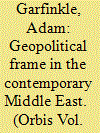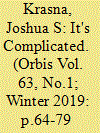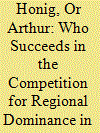|
|
|
Sort Order |
|
|
|
Items / Page
|
|
|
|
|
|
|
| Srl | Item |
| 1 |
ID:
143269


|
|
|
|
|
| Summary/Abstract |
The geopolitical frame is a necessary but insufficient means to understand the contemporary Middle East. Defining the term in its original, fairly narrow, way puts the analytical spotlight on the Westphalian units—namely, states—that compose the classical modern international system. But those states’ lack of decisional agency is itself at the core of the region's instability. As for the region, its troubles are likely to persist for some time. Outsiders cannot fix it; at best, if they are skillful and lucky, they can contain it.
|
|
|
|
|
|
|
|
|
|
|
|
|
|
|
|
| 2 |
ID:
133775


|
|
|
|
|
| Publication |
2014.
|
| Summary/Abstract |
Because autocrats can rarely be voted out of power, most find themselves exiting office in far less conventional ways. Since the 1950s, the coup d'état-or the illegal seizure of power by the military-has been by far the most common.1 During the 1960s and '70s, for example, about half of all autocrats who lost power did so through a coup. But fast-forward to the 2010s, and a different picture is emerging. The chain of protests during the Arab Awakening, which toppled four of the world's longest-standing rulers-Zine al-Abidine Ben Ali of Tunisia, Hosni Mubarak of Egypt, Muammar Qaddafi of Libya, and Ali Abdullah Saleh of Yemen-led many political observers to rejoice in the masses' ability to unseat autocratic strongmen. But are these revolts evidence that autocrats are becoming increasingly vulnerable to the masses? Or are they short-term exceptions to a longer-standing rule of autocratic ouster?
|
|
|
|
|
|
|
|
|
|
|
|
|
|
|
|
| 3 |
ID:
170141


|
|
|
| 4 |
ID:
167654


|
|
|
|
|
| Summary/Abstract |
Memory-making and the use of memory is always political, and more visibly so in times of crisis, conflict and transition. The current situation in the Middle East and North Africa is no exception to this, where we have seen history, and specific narratives stemming from it, being mobilized toward certain political goals. In taking time as a distinct analytical category, this special issue aims to show that its explicit consideration transforms the ways in which we understand current political dynamics in the Middle East and North Africa. Both memory and time can be illuminating in drawing connections between the political, the economic and the social, thereby shedding new light on old conflicts on the one hand, and bridging the gap between the political and the social/cultural on the other.1
1 Alon Confino (1997Confino, A. (1997) Collective Memory and Cultural History: Problems of Method, American Historical Review, 102(5), pp. 1386–1403.
[Crossref], [Web of Science ®] , [Google Scholar]
) Collective Memory and Cultural History: Problems of Method, The American Historical Review, 102(5), pp. 1386–1403.
View all notes
As Charles Tilly noted, the politics of memory can tell us about both shared historical experiences and their effects on politics today, as well as the contestation or coercion over interpretations of the past—and present.2
|
|
|
|
|
|
|
|
|
|
|
|
|
|
|
|
| 5 |
ID:
177513


|
|
|
|
|
| Summary/Abstract |
Since the end of World War II, several local actors have tried to gain regional dominance in the Middle East. These attempts have met with varying levels of success. This study seeks to explain this variation. We will not address the equally important question of when and why specific states decide to make bids for regional dominance. We maintain that while realism is a useful theoretical lens for explaining this variation, it is necessary to adjust some realist assumptions slightly to make realism work well in the Middle Eastern context. This is so because realism was developed based on modern European and American experiences. Specifically, our adjustments of realism's assumptions produced the following three preconditions that must be met for a local actor's bid to succeed. First, one must pursue those types of power which are the most potent at a specific time given the Middle Eastern environment. Second, while traditional realists recommend forging large coalitions by reducing threat perception and making bargains through traditional diplomacy or Realpolitik, we argue that domination through subversion or intimidation is more effective. Third, one must not only avoid counterproductive intervention by the great powers, but also have them actively on one's side.
|
|
|
|
|
|
|
|
|
|
|
|
|
|
|
|
|
|
|
|
|